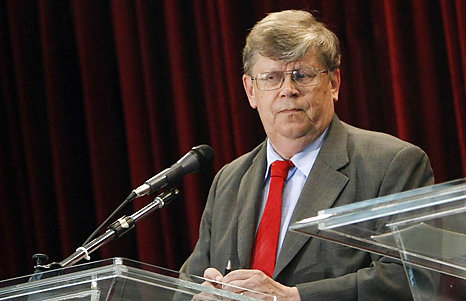Olli Heinonen: No strong will to create WMD-free Middle East

TEHRAN - Olli Heinonen, the former deputy director general for safeguards at the International Atomic Energy Agency (IAEA), tells the Tehran Times that there is no strong will among Middle East countries to push for a “weapons of mass destruction free zone”.
Israel is widely believed to have amassed hundreds of nuclear arms. It is also the only country in the Middle East which has refused to sign the nuclear Non-Proliferation Treaty (NPT).
Heinonen, now a senior advisor on science and non-proliferation at Foundation for Defense of Democracies, also believes that a recent UN on banning nuclear bombs would not work.
“If and when they (nuclear armed states) abandon nuclear weapons, it is more likely that they would do so not under the Ban Treaty but the NPT,” the former senior IAEA official notes.
Following is the text of the interview with Heinonen:
Q: After months of talks in the face of strong opposition from nuclear-armed states and their allies finally 122 countries at the United Nations headquarters in New York adopted a treaty on July 7 on the prohibition of nuclear weapons. So why despite strong emphasis on nuclear disarmament, the treaty came so late?
A: We are not without progress in nuclear disarmament. At the height of the Cold War the U.S. and Soviets had over 60000 warheads in their arsenals when today there are slightly less than 10000 warheads. In their meeting Presidents Reagan and Gorbachev agreed in Reykjavik to eliminate an entire class of nuclear weapons, short and intermediate range missiles. Since then, however, the broader momentum has been lost. While the U.S. and Russia have implemented the Reykjavik agreement, the number of states possessing nuclear weapons has increased, and four states, China, Pakistan, India, and more recently also North Korea are not only increasing their nuclear warhead inventories, but diversifying their nuclear arsenal platforms.
Q: Can the UN treaty lead to disarmament of nuclear weapons states?
A: I do not feel that the Treaty on the Prohibition of Nuclear Weapon or otherwise known as the Ban Treaty will put fire on the actions of states possessing nuclear weapons. The fact that they did not participate in the negotiations shows that. The Treaty has elements, which go against the visions of those states as well as global disarmament. Many of them see the verification provisions as weak, and it undermines the Nuclear Nonproliferation Treaty (NPT) verification regime that includes a comprehensive safeguards agreement and additional protocol as de facto IAEA verification standards today. Regrettably, the Treaty negotiators did not include the additional protocol as a requirement.
“FMCT would be an important step in stopping production of nuclear material for weapons.”Q: Can the treaty put pressure on nuclear weapons states?
A: Nuclear weapons states that are party to the NPT have already committed to cessation of nuclear arms race and eventually to disarm, and to negotiate a Treaty for complete disarmament under international verification. At Reykjavik, the U.S. and Soviet Union took important steps in curbing the arms race. India, Pakistan, Israel and North Korea are not parties to the NPT, but it is hard to see the Ban Treaty offering them incentives to that end. If and when they abandon nuclear weapons, it is more likely that they would do so not under the Ban Treaty but the NPT, which provides stronger safeguards against clandestine nuclear programs. Such an assurance is indispensable for disarmament to proceed. Actually, by requesting additional protocol type of measures only from the states that dismantle their nuclear weapons, makes the treaty discriminatory.
Q: Why the IAEA has never been seeking nuclear disarmament?
A: The IAEA statutes, which include the objectives and functions of the Agency, do not make a direct reference to nuclear disarmament. However, the statute describes the IAEA’s role as to promote peace and international cooperation as well as furthering establishment of safeguarded worldwide disarmament. Given its technical safeguards verification capabilities, the Agency has been called on to verify the dismantlement of nuclear weapons programs of Iraq, South Africa and Libya. These cases demonstrate that the Agency can – with additional resources – undertake such tasks, if requested by the international community.
Q: As a person who worked for some years in the IAEA, have you ever taken any action for disarmament? If yes, what obstacles did you face?
A: As an IAEA staff member, I participated in verification and dismantlement activities in Iraq, South Africa and Libya. After I left the IAEA, I served as a technical advisor to Ambassador Laajava, who worked extensively to facilitate a meeting for the creation of a Weapons of Mass Destruction Free Zone in the Middle East. But there is not sufficiently momentum in the countries of the region to convene a ministerial level meeting to kick off the negotiation process. The other obstacle is the fact that nuclear weapons play an important role in the security doctrines of several countries. Until we can solve those concerns, it is difficult to see that another initiative – the Fissile Material Cut-off Treaty (FMCT) negotiations - that I have been involved in recent years, can move on from the current stalemate. FMCT would be an important step in stopping production of nuclear material for weapons. Is this possible? Yes, but it will be difficult to make sure that such a Treaty is also verifiable. That requires new thinking and leadership particularly on the side of states with nuclear weapons.
